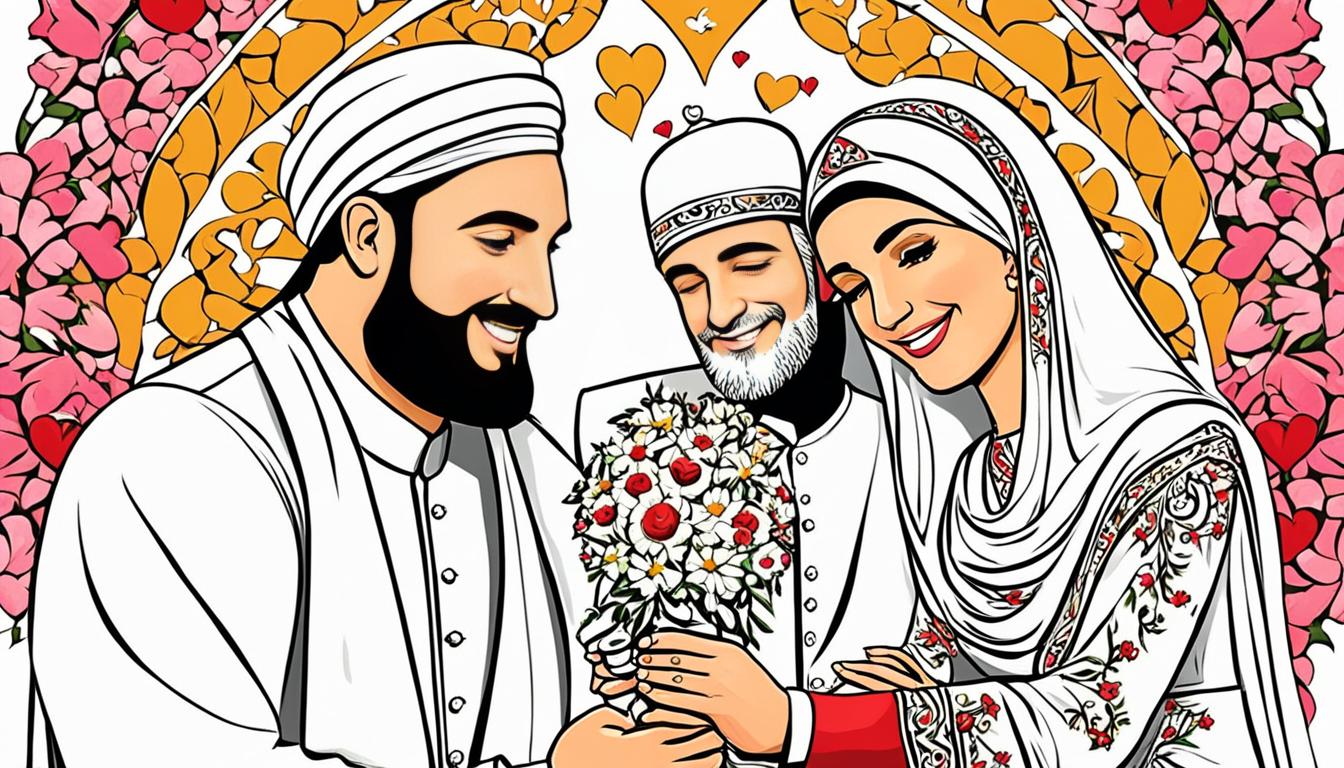Love, Marriage, and Family: Islamic and Interfaith Perspectives
Today, more couples from different faiths are getting married, raising questions about love and religious differences. In the U.S., about 39% of marriages are between people of different faiths. This trend is especially true in Canada. We’ll look at how Islamic and interfaith views on marriage have changed over time.
More Muslims are marrying outside their faith, leading to new challenges. Parents worry about their children’s faith, and there are old rules against Muslim women marrying non-Muslims. This article will explore how tradition and modern values mix in these families.
We’ll focus on Islamic values in families and how respect and growth are key. We’ll see how love can bridge faith gaps. But we’ll also talk about the hurdles these couples face.
Key Takeaways
- Interfaith marriages are becoming more common, especially between Muslims and non-Muslims.
- Many Muslim parents worry about keeping their children’s faith.
- Old rules against Muslim women marrying outside their faith are changing, with some scholars supporting these unions.
- Islam teaches respect and dialogue between faiths, promoting understanding.
- Good communication and empathy help couples in interfaith relationships.
- Family support is key for interfaith marriages, through respecting differences and growing spiritually together.
The Concept of Love in Islamic and Interfaith Contexts
Love is key in both Islamic and interfaith settings, covering emotional and spiritual aspects. In Islam, love is the base of relationships and viewed as a gift from God. This deep bond shapes the marriage relationship, building respect and faith between partners. Interfaith relationships add complexity, as couples blend different beliefs while keeping love strong.
Islamic Views on Love
Islamic love focuses on spiritual growth and respect between partners. It’s shaped by the Prophet Muhammad ṣallallāhu ‘alayhi wa sallam’s teachings. He showed love through kindness and care in his relationships. For many, love in marriage is tied to their faith, giving a sense of belonging and shared values.
The Sunnah of Love shows the importance of talking openly and supporting each other emotionally. This shows how deep commitment makes a marriage stronger.
Understanding Love in Interfaith Relationships
Interfaith relationships mix different beliefs and traditions. Marriage in these unions is complex, especially with nearly 40 percent of US marriages since 2010 being interfaith. Couples must respect each other’s backgrounds while building a united partnership. Talking clearly is key to overcoming differences.
Love across faith lines can be rewarding, but understanding limits and finding common ground is important for success.
| Aspect | Islamic View | Interfaith Perspective |
|---|---|---|
| Definition of Love | Divine gift rooted in faith | Emotional connection beyond religious boundaries |
| Marriage Foundation | Faith-based commitment | Shared values and respect for differences |
| Challenges | Strict norms on interfaith unions | Navigating cultural and religious barriers |
| Communication | Open and respectful dialogues | Negotiation of beliefs and traditions |
| Role of Community | Supportive in faith-based marriages | Varied levels of acceptance among communities |
Marriage in Islam: A Framework of Beliefs
Marriage in Islam is built on key beliefs that shape its customs and family roles. These customs not only guide couples but also highlight the importance of community and family in these unions.
Islamic Marriage Customs and Traditions
At the heart of Islamic marriage is mutual consent, respect, and shared faith. The Quran clearly states that marrying outside one’s faith is forbidden. This shows how crucial shared beliefs are for partners. A woman’s guardian, usually a father or relative, must agree to her marriage, as taught by Abdullah bin Amr bin Al-As.
This tradition underlines the big role families play in marriage. It ensures the couple gets the support they need. The idea of dowries, or *mahr*, is also key. It shows a man’s promise and duty to his future wife. The *nikah* ceremony, a key ritual, makes the marriage official in the eyes of the community. It also shows how families are deeply involved and have certain expectations.
The Role of Family in Islamic Marriages
Family has a big impact on Islamic marriages. It’s not just about giving consent or helping with money. Families help with daily life and planning for the future. They often help solve problems and offer support.
But, this can also mean pressure to follow cultural norms, especially in marriages between different faiths. These marriages create a sense of belonging. Shared values and customs form a network of support for both partners.
Interfaith marriages can bring cultural changes, childcare issues, and identity conflicts. Over time, Islamic marriage has changed, blending old values with new challenges from society.
Love, Marriage, and Family: Islamic and Interfaith Perspectives
Interfaith marriages bring unique experiences and challenges. Couples in these marriages face hurdles from different backgrounds and beliefs. Overcoming these challenges can make relationships stronger and more understanding.
Common Challenges Faced by Interfaith Couples
Many interfaith couples find it hard to stay together because of big differences in their backgrounds and beliefs. A couple in a long marriage shows this, with ongoing talks about divorce. The husband points out issues like:
- Incompatibility in education and cultural understanding
- Challenges in raising their child within a blended religious framework
- Declining emotional intimacy and sexual reluctance
- Moral dilemmas surrounding fidelity and the implications of potential second marriages
These issues go beyond personal problems to affect society and family too. Overcoming them needs open talks, counseling, and understanding each other’s views.
Benefits of Interfaith Marriages
Despite the challenges, many couples see big benefits in interfaith marriages. These marriages often lead to better cultural understanding and a wider family view. Couples say that:
- They achieve deeper connections based on empathy and compassion
- The blending of cultures enriches family life and traditions
- Working together on parenting improves child-rearing
- Seeing different views makes them more open-minded
These benefits show how embracing differences can lead to growth and unity. By valuing respect and shared values, interfaith couples can build a supportive space. This strengthens their relationship.
The Intersection of Islamic and Interfaith Family Values
Islamic family values are key for many Muslim families. They stress respect, responsibility, and being part of a community. These values shape how families act together, focusing on supporting each other and sharing values. Interfaith families, on the other hand, mix different traditions and beliefs. It’s important to understand these differences to live together peacefully.
Core Islamic Family Values
Respect is at the heart of Islamic family values. Family roles come with clear duties, showing the need for care and support. The idea of responsibility highlights the duty to meet family needs. Community cohesiveness is also crucial, making family ties strong and connected to the wider community.
Navigating Different Values in Interfaith Families
Interfaith families face challenges blending different values. Islamic values often focus on spiritual beliefs, making it hard to find common ground. Talking openly is key to understanding and accepting these differences. By valuing respect and understanding, couples can make a loving home for their kids. Creating special rituals that include both traditions can also bring families closer together.
Building Family Dynamics in Interfaith Relationships
Creating strong family dynamics in interfaith relationships is both challenging and rewarding. It’s important to find ways to honor both parents’ traditions. By doing this, couples can help their children understand and appreciate their diverse backgrounds.
Strategies for Successful Co-parenting
Successful co-parenting in interfaith families means talking openly and respecting each other. Here are some tips to help:
- Establish Clear Communication: Talk often about your beliefs to help your kids get to know their heritage.
- Define Shared Values: Pick values like respect, love, and empathy that bring you together as a family.
- Celebrate Both Backgrounds: Join in each other’s religious and cultural events to let your kids experience both sides.
- Encourage Curiosity: Let your kids ask questions about their beliefs to help them feel connected and curious.
Adapting Traditions in a Blended Family
Adapting traditions can make family life richer and more meaningful. Here are some ideas for traditions in a blended family:
- Create New Rituals: Make your own family traditions that mix elements from both religions for a fresh take.
- Incorporate Educational Activities: Use holidays to teach your kids about their heritage through fun activities.
- Engage Extended Family: Get grandparents and other relatives involved in talking about traditions to widen your kids’ knowledge.
Using successful co-parenting strategies and adapting traditions helps interfaith families thrive. It creates a supportive environment for kids. It also respects different beliefs and brings everyone together in unity.
| Strategy | Description |
|---|---|
| Clear Communication | Talking about beliefs helps everyone understand each other better. |
| Shared Values | Finding common values helps the family stick together. |
| Celebrating Diversity | Joining in both traditions gives a richer experience. |
| Curiosity | Encouraging questions helps kids feel part of the family. |
| New Rituals | Creating new activities together can make traditions more special. |
Conflict Resolution in Interfaith Marriages
Interfaith marriages bring unique challenges, especially when dealing with different beliefs. It’s key to solve these conflicts to keep a healthy relationship. Talking openly about religious differences helps couples understand and respect each other more. This leads to a stronger bond and a solid base for their relationship.
Communicating Religious Differences
Talking openly about faith is crucial in interfaith marriages. It lets partners share their beliefs and clear up any confusion. Many couples skip this talk, thinking love alone will solve everything. But this can lead to big problems later.
Experts say it’s best to talk about beliefs early. This helps couples deal with differences in child-rearing, celebrations, and other customs. Here are some tips for talking things out:
- Active Listening: Listen to your partner without judging. Understand their feelings and views.
- Empathetic Engagement: Imagine how your partner feels. This helps you understand their beliefs better.
- Share Personal Stories: Talking about your own faith and culture can bring you closer.
Finding Common Ground
Finding things you both agree on is key to unity in marriages. Couples who accept their differences and find common ground often strengthen their bond. Talking about beliefs helps them see similarities and make decisions together, like how to raise kids or celebrate holidays. Here’s a table with common issues and solutions for interfaith couples:
| Challenge | Potential Solution |
|---|---|
| Difficulties in decision-making about religion | Use clear communication and respect each other’s beliefs. |
| Conflicts over child-rearing practices | Make a plan for raising kids that respects both faiths. |
| Exterior pressure from friends and family | Stick together and ignore outside opinions. |
| Feelings of exclusion from religious communities | Look for welcoming communities or make your own traditions. |
Talking things out helps interfaith couples grow closer and understand each other better. This leads to a more rewarding marriage as they face the challenges of their different faiths together.
The Role of Community in Interfaith Relationships
Community support is key for interfaith relationships. Couples with different beliefs find strength in supportive networks. These groups celebrate diversity and teach their members about the challenges interfaith couples face.
Support Systems for Interfaith Couples
There are many ways to help interfaith couples. Faith groups, educational programs, and social clubs offer spaces for sharing and advice. These support systems are vital for improving the lives of interfaith families.
- Faith communities that promote understanding and acceptance of interfaith dynamics.
- Interfaith family groups offering education for children about multiple religious traditions.
- Workshops and events specifically tailored for interfaith couples, enhancing connection and dialogue.
- Online resources providing access to diverse interfaith experiences.
- Clergy training programs designed to equip religious leaders with tools to support interfaith marriages.
Supportive communities help interfaith couples flourish. They make relationships stronger by understanding the challenges and offering the right resources. This support shows how much partners are committed to each other.
| Support Type | Description | Examples |
|---|---|---|
| Faith Communities | Groups that welcome interfaith relationships and provide spiritual support. | Unitarian Universalist congregations, interfaith networks. |
| Educational Initiatives | Programs aimed at informing families about religious diversity and practices. | Interfaith Family Communities, Religious Studies courses. |
| Social Groups | Circles where interfaith couples can meet and share their experiences. | Meetups, online forums, community events. |
Advice for Couples Entering Interfaith Marriages
Entering an interfaith marriage brings both challenges and chances. Couples can get helpful advice to deal with these issues. It’s key to respect each other’s beliefs and build a united family life. Talking openly and understanding each other well is crucial for a strong start.
Respecting Each Other’s Beliefs
Couples in interfaith marriages should focus on respecting beliefs. They should talk about each other’s faith and values. Knowing the importance of each religion helps create a welcoming atmosphere. Here are some tips:
- Join in each other’s religious activities to learn more.
- Talk about any feelings of guilt from different backgrounds.
- Learn about the cultural and religious traditions that shape your partner’s beliefs.
Creating New Traditions Together
Doing well in interfaith marriages often depends on creating family traditions that show both partners’ backgrounds and shared values. Making new customs can bring both families closer. Here are some ideas:
- Celebrate important holidays from both religions.
- Get your kids involved in learning about both faiths to make it inclusive.
- Make new traditions that show the unity of both backgrounds.
Conclusion
In summary, love and family in Islam and interfaith settings are built on understanding, respect, and shared values. Islam sees marriage as a sacred bond, requiring mutual consent and family support. This approach creates strong marriages and clear roles in the family, leading to stability and support for everyone.
Interfaith marriages bring unique challenges but also opportunities for growth. Successful couples find that their differences make their bond stronger. By valuing their diverse backgrounds, they build rich family lives and deepen their connections. This shows that love can overcome religious differences.
The journey of love, marriage, and family in Islam and interfaith settings is about commitment to shared values. It reminds us that with effort and understanding, relationships can thrive. They become a source of joy and strength for families from different backgrounds.
Source Links
- When Muslims Intermarry — The Interfaith Observer
- Growing Up in an Interfaith Family Taught Me Love and Respect
- Love And Marriage But Different Faiths
- No title found
- Understanding Muslim Marriage Rules | Courtly
- Yahya Ibrahim | The Sunnah of Love
- Interfaith Marriage: Quranic, Hadith, Psychological, Social, and Economic Perspectives
- TOC-84-2.qxd
- Interfaith Family and Marital Problems, Parents & Teens (Counseling Q/A) | About Islam
- Considerations for Marrying a Muslim Man — Crescent Project
- No title found
- Will My Children Be Muslim? The Development of Religious Identity in Young People | Yaqeen Institute for Islamic Research
- What’s it like to ‘be both?’ An interview with interfaith family pioneer, researcher, Susan Katz Miller — KEN CHITWOOD
- Let’s Talk About Interfaith Families
- Communication Tips for Interfaith Couples
- 15 Common Interfaith Marriage Problems and How to Fix Them
- The role of clergy in supporting interfaith families
- Interfaith Couples – Being Both
- 15 Ways to Make Interfaith Relationships Work
- The Complexities of Interfaith Relationships
- Ecumenical and Interfaith Marriages
- Islamic Teachings on Family and Marriage – GlobalSadaqah.com Blog







